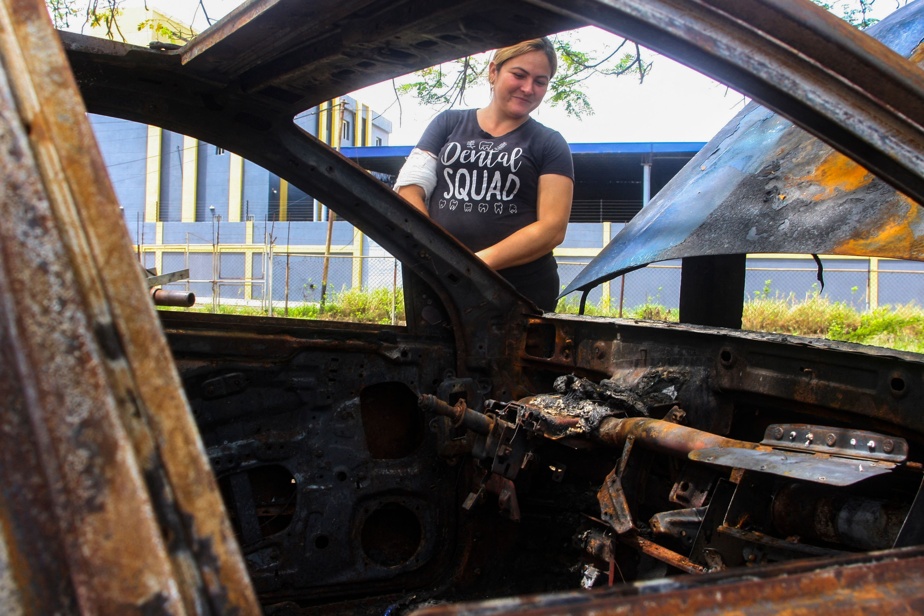(Maracaibo) Videos of vehicles spontaneously catching fire have been flooding social media in Venezuela in recent days. Experts and consumers point to the quality of gasoline, the public oil giant denies it.
” Everything happened so fast. Thank God we are alive,” consoled José Faria, 42, lying on his bed, his face and arms almost entirely covered in bandages. His taxi suddenly went up in flames in Maracaibo and is nothing more than a charred sheet.
“People were scared. They tried to help us, but we had no fire extinguisher, sand or water,” he said.
José says he was with his wife Leydi when he heard a noise in the back seat. He got out of the vehicle to understand what was happening just as an explosion followed by the fire of his taxi.
He suffered second-degree burns, while his wife was less seriously affected in the right forearm.
“We lost our source of income but thank God we are alive,” repeated José, visibly shocked.
Similar cases have multiplied in recent weeks. Firefighters receive an average of four calls a day for vehicles suddenly catching fire, according to sources who spoke on condition of anonymity for fear of reprisals.
Although Petroleos de Venezuela (PDVSA) denies that these fires are linked to the poor quality of gasoline distributed in Maracaibo, experts are doubtful.
“There were failures in the refineries” of the Paraguana complex, “responsible for the processing, refining and distribution of fuel for the state of Zulia (of which Maracaibo is the capital)”, Hugo told AFP. Hernandez Raffalli, former executive of PDVSA.
Specialists agree that, for lack of solvents, the gasoline distributed is very corrosive with high concentrations of sulphur, which damages the gasoline pumps of cars, but above all increases the risk of fire.
The region, although the country’s former oil capital, has suffered from recurrent fuel shortages for more than ten years, aggravated by smuggling.
With the state heavily subsidizing gasoline which was almost free until 2020, traffic to Colombia was booming. In 2019, an egg in a supermarket cost the equivalent of 90 million liters of gasoline!
Ibsen Chacin, a 52-year-old mechanic, overhauled 25 cars in the past two weeks whose fuel pumps no longer worked.
“The cars are stuck in the middle of the road and you are called to solve the problem… They (PDVSA) say that the gasoline is perfect but pfff”, he breathes without saying more. “Even if the parts are of poor quality, it’s not possible for them to last only a few days” with this essence, he says.
Maria Urdaneta had to change the gas pump in her van seven times in three weeks. “We live in a state of stress for fear of breakdown or worse of a fire,” explains the 47-year-old trader.
“It’s not normal, it’s a huge wear and tear. If I keep going at this pace, I’m going to have to park the car and get around on a scooter,” she said.
At the same time, the sale of fire extinguishers has exploded, according to traders.
Faced with the wave of complaints, PDVSA is defending itself with a communication campaign on social networks. Yamaru Duran, a quality control specialist at the Venezuelan Institute of Petroleum Technology (Intevep), assures in a video that the gasoline distributed in Zulia has successfully passed all the tests.
“Smell it, smell it,” an official says in another video as he passes a plastic canister to several other people. These videos are mocked on the networks. “PDVSA founds the first Academy of Essence Sommeliers,” quipped “The Fake Post.”

